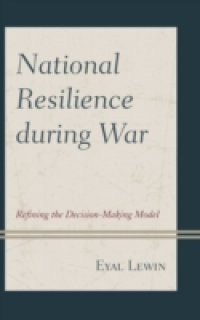In political science, war is generally considered the most traumatic event a nation faces, often posing threats to a nation's very existence. The challenge of surviving the war may, therefore, prove central to the life of a nation. However, national resilience during war has not yet been fully investigated. National Resilience during War: Refining the Decision-Making Model, by Eyal Lewin, searches for the mechanisms of national resilience through a deep inquiry into nine different case studies taken from the scenery of World War II. Following a multi-disciplinary attitude, a business management model is adopted (the PEST and SWOT model) and political, economic, social, and military-technological factors are analyzed for each of the case studies. The result is a comprehensive political decision-making model on a national level that can serve as a means for leaders to navigate successfully in geopolitical turbulence as well as for social scientists to better understand the defeats that different countries suffer and the victories that others demonstrate. This research, however, goes further by refining the model and pointing to the exact combination of factors that are crucial for a nations ability to win its wars. Using a qualitative comparative analysis technique, the exact combination is traced. The results emphasize that the winning scheme blends political and social factors together: leadership, positive psychology and an inspiring national ethos prove to be a necessary, though not a sufficient, conditional combination for success. National Resilience during War fills a significant gap in the literature on the politics of war.

